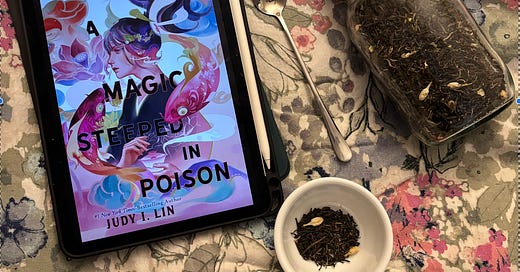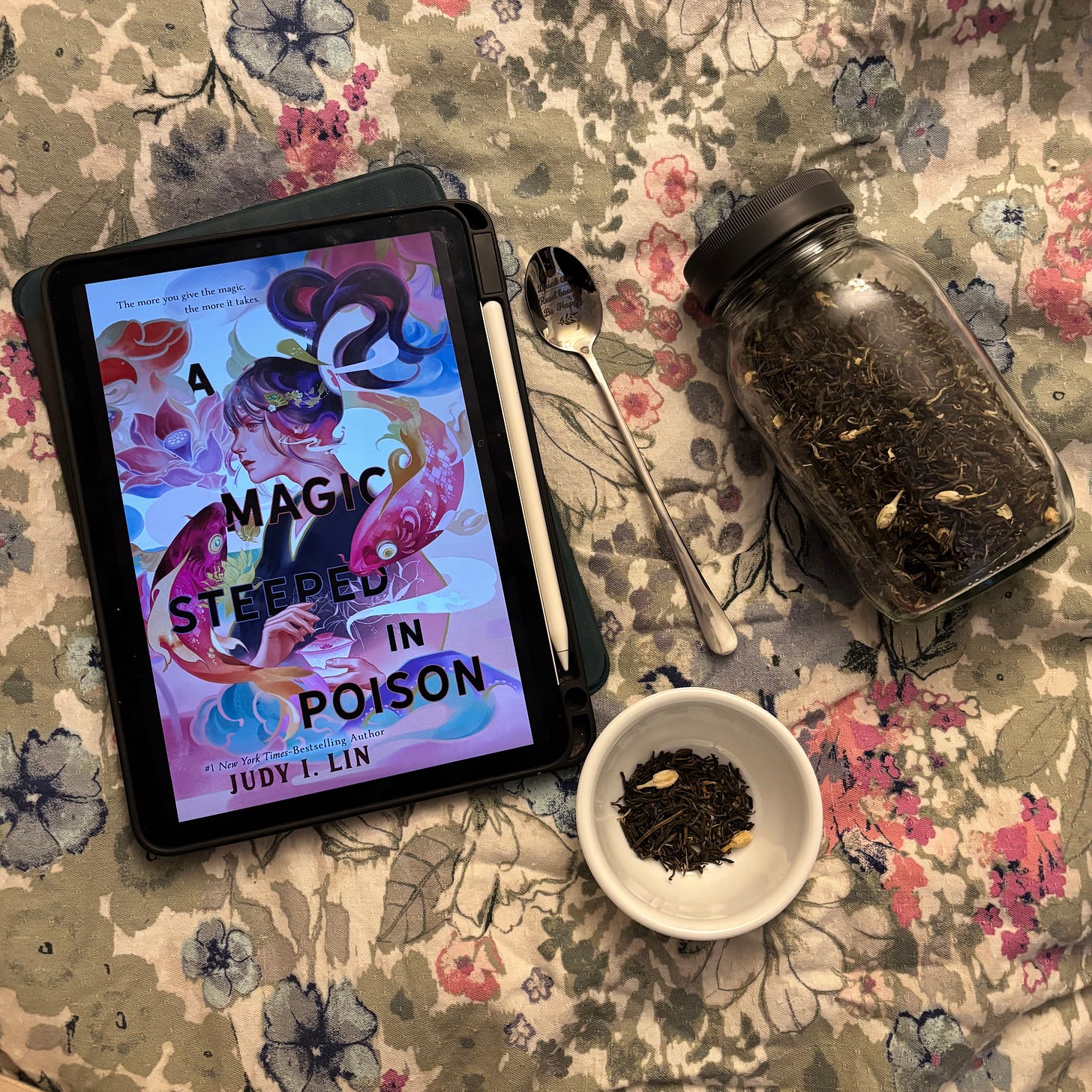I’ll be honest, friends, I was debating posting this read. This book was recommended to me by a friend who was also reading it at the time, and we thought it would be fun to read together and give our thoughts. I breezed through this read, but more because I wanted to get it over with. I wanted to give my honest thoughts, so I decided to post this review.
This post is the second in my series of tracking all of the books I read through 2025. If you haven’t read the first post, check it out here!
Book: A Magic Steeped in Poison
Author: Judy I. Lin
Genre: Asian Young Adult Fantasy
Rating: 0.5/5
For Ning, the only thing worse than losing her mother is knowing that it’s her own fault. She was the one who unknowingly brewed the poison tea that killed her—the poison tea that now threatens to also take her sister, Shu. When Ning hears of a competition to find the kingdom’s greatest shennon-shi—masters of the ancient and magical art of tea-making—she travels to the imperial city to compete. The winner will receive a favor from the princess, which may be Ning’s only chance to save her sister’s life. But between the backstabbing competitors, bloody court politics, and a mysterious (and handsome) boy with a shocking secret, Ning might actually be the one in more danger.
Spoilers for A Magic Steeped in Poison
Asian fantasy is a fascinating concept to me. The author can explore many areas, diving into Japanese, Korean, Chinese, or Filipino history, and that’s just naming a few ideas. The mythology is rich in each culture, filled with eccentricities and gorgeous details that could be fun to navigate.
The concept for A Magic Steeped in Poison is no less fascinating. A magic system based around tea has the potential for amazing things. Tea that can reveal secrets, tea that can link memories, tea that can strengthen the body or leave it weak, all of these ideas are explored in the book.
Unfortunately, that is where the excitement ends. While the writing is beautiful and prosaic, everything else falls a little flat… While the concept of a Chinese fantasy based around tea and poisons and a competition to show who can be the best shennon-shi is so unique in its own right, somehow, this book doesn’t feel special. It follows the same-old same-old YA tropes and leaves out anything truly interesting. The characters are just kinda… blah. They are distinct and have a part to play in the story, but I found some of the leaders of the competition blending together, and it was difficult to tell them apart at times.
Ning is not a fun character to have the story told through. This story is written in first-person, a personal pet peeve of mine. I don’t know why some fantasy authors decide to write fantasy fiction in first-person point of view. It’s incredibly limiting and makes worldbuilding susceptible to info-dumping because integrating the information is a little more difficult from such a limited perspective.
Even if this book was written in the third-person point of view, Ning would still be a poor character. The choices she makes leave one scratching their heads. She decides to enter the competition for the shennong-shi, but each apprentice, known as the shennong-tu, is registered with a written system known as The Book of Tea. It’s by some convenient miracle that her mother didn’t have Ning’s sister, Shu, officially registered, since that’s the only way Ning can enter the competition. She thinks that all of this sneaking around and lying gets her far without being caught until the very end of the competition when she’s ratted out for lying her way into the competition and is indicted for some other decisions she made during the story.
Ning’s personality is so rough. I don’t mind rough characters, as they can add a lot of nuance to the story, but there’s something about older sister main characters that makes authors want to write them as so insecure and brusque. Ning is always comparing herself with her sister, saying that Shu is better at tea-making and being the better sister and having all the looks and talent. Meanwhile, Ning is the slip-up, the failure, the course and rough sister. While parts of this personality are understandable due to the way that she grew up, there are parts that seem so heavy-handed. There are parts of her personality that simply don’t need to be so off-putting.
Ning continually makes decisions throughout the book, never once thinking about the consequences. At the beginning of the competition, she presents her tea to the judges, quoting a poem written by a revolutionary. While this would be offensive in any palace, the action is specifically weighty here, as the royal family dealt with an attempted coup led by the Emperor’s son just a few years before. The judges are, understandably, offended by her decision, yet Ning stands and only realizes after the judges exclaim their shock that the poet she quoted was a revolutionary.
She wasn’t intentionally making a statement; she just simply… forgot. Then, she blamed her ignorance on the fact that she lived in the country.
Decisions are made in this book, and it made me say, “What? Why?” out loud as I read. It is told at the beginning of the book that the emperor is sick, most likely because of the poisoned tea bricks that are being circulated throughout the cities. But then, it’s later revealed that the emperor has been dead for weeks, and his death has been kept a secret until during the competition. Why was his death kept a secret for so long?
The remaining royal heir is the princess, someone written as ethereal and lovely at first, but as we get to know her more, she feels like another stale character. She decided to keep her father’s death a secret, but why? Why not just ascend the throne? There were multiple assassination attempts on the princess's life, but that’s not stated as the reason for her refusing to take the throne.
The romance in this book is also not special either. Ning meets a boy named Kang, who first introduces himself as the son of an imperial general. Unfortunately, but to no surprise, he lied about who he was and he’s revealed to be the adopted son of the treacherous emperor’s son. Ning loves Kang because of his troubled past and the fact that he just needs someone to understand him. He’s filled with knowledge of the palace since he lived there for a time. He offhandedly mentions a rumor that the princess has a stone to heal any illness, and Ning immediately thinks of Shu. But once Ning learns from the princess herself that such a stone is only a myth, Ning turns on Kang and calls him a liar. Not once did she curb her expectations and work to gather information before setting all of her hopes on a magical rock that only exists in myths. She plunges head first and sets all expectations on the stone.
When the princess hires Ning to spy on Kang and report back for information, Ning does not hesitate to try and get closer to Kang, just to get what the princess needs. She manipulates the situation and acts so problematically, only to tell Kang that she lied to him the whole entire time and she doesn’t care for him at all, even though we see in her thoughts that she actually does. She’s not forced to put aside her feelings for anything offered to her. She just decides that she doesn’t want to be with Kang anymore. It’s just so problematic.
Lin also decided when writing the book to imply that the princess was in a secret relationship with her female bodyguard, a relationship that was not necessary and felt like it was added in just for representation’s sake. It came straight from left field, and I feel like those additions should be reflected in the genre a book is placed into, regardless if it doesn’t include the main character.
There were parts of this book that I appreciated. I love a good food competition, and each of the rounds was so interesting to read. Unfortunately, when it comes to the worldbuilding, story, or characters, everything just feels flat and unspectacular. I got through about 75% of the book before I felt like I had wasted my time a little by picking it up.
I’d love to find an Asian fantasy that I enjoy reading. Between this read and last year’s read of The Girl Who Fell Beneath the Sea, I’m wading through Asian Fiction books I don’t particularly like to find something I enjoy.





